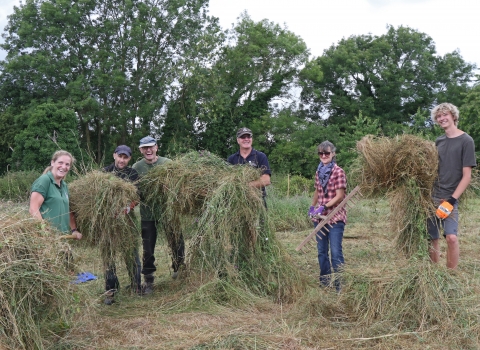The wider countryside team is responsible for all nature conservation matters outside of our own land. They advise and train land managers and work with local authorities across the county to enhance and protect wildlife on their land, whether by advising on the use of fertilisers or enhancing new developments for wildlife.
Areas of work
- Managing the Trust’s arable sites and advice to landowners on environmentally-sensitive farming practice.
- Engaging landowners and farmers to aid in the protection of our environment and reduce water pollution through infrastructure investments and management schemes as well as various projects and initiatives.
- Providing input into the planning and development control process with local authorities, the public and other partners.
- Delivering habitat surveys, management advice and assistance with grant applications for projects that aim to create or restore wildlife rich habitats.
| Skills |
|
| Knowledge |
|
| Experience |
|
| Personal qualities |
|
Case study: Beth Norris, Wildlife and Water Officer
My route into conservation was not straightforward or easy. I’m from Gloucestershire but grew up in Devon. I’d be swimming or sailing at the seaside as often as possible, which ignited my love of water from an early age. Although I’d done well academically in school, I failed my first year of sixth form thanks to financial hardship leading me to work multiple part-time jobs, which felt terrible at the time. I switched from science-based subjects to humanities and studied English Literature at university.
At a loss after leaving university, I worked in a call centre for administering financial products. Being inside for 10 hours a day without a window was not good for me. I started to think about what I was passionate about. I knew I loved the outdoors, water and nature. The real turning point for me was reading ‘Turning the Tide on Plastic’ by Lucy Siegle, which made me really want to take action for nature. It had never even crossed my mind up to that point that I could do something like conservation as a career.
As I was still working, I decided to study Environmental Science through distance learning at the Open University. I loved learning about hydrological and nutrient cycles and it enabled me to appreciate water habitats from a different angle. I also joined a local group of conservation volunteers and later volunteered at Slimbridge Wetlands Centre, where I gained new skills, such as water quality testing, and learnt a lot about wetlands and wildfowl. I also got a seasonal job at an ecology consultancy where I learnt some survey skills.
Once my seasonal position came to an end, I was offered a job at Slimbridge as the Conservation Veterinary Support Officer. Although I loved working so closely with birds, I really wanted to work with freshwater habitats at a landscape scale. When I saw the Wildlife and Water Officer job at Worcestershire Wildlife Trust, it felt perfect. I was worried I wouldn’t get the job through lack of experience or ecological knowledge but I think my passion for water-related habitats shone through. I’m still learning, and I always will be, but I know I’m in the right place doing the right thing!
I think it’s important for anyone who wants to work in conservation to know that they can do it, no matter their background or education. Volunteering is a great way to gain skills and knowledge and was a key part of my journey.
Case study: Simone Mansi, Severn Treescapes Trees and Woodland Advisor
Since I was a child, I have always loved being outdoors in nature. Having been lucky enough to grow up in a couple of different countries, I got to see some very beautiful places that further fuelled my fascination and love for wildlife. When I came to the UK for university, I was excited to have a whole new range of habitats to explore, although the cold was a bit of a challenge at first having arrived from Southeast Asia!
I studied zoology at the University of Reading, knowing I wanted to work in nature but not knowing much more past that. There, I deepened my understanding of how ecosystems function as a whole, with each small aspect contributing to something bigger. While I was initially excited about the chance to handle snakes in the reptile module practical sessions and see wolves on our visit to the nearby wolf sanctuary, all of which was very cool, I greatly appreciate the strong foundation in ecology that I gained. I further built on this at the University of the West of England, doing a Master’s in advanced wildlife conservation in practice, where I became especially interested in habitat conservation and creation. I particularly enjoyed the ‘in practice’ part of the course, further consolidating my desire to do something hands-on and outdoors.
I did a lot of volunteering with local parks and reserves throughout my degree, meeting some brilliant people and doing some really rewarding practical work. I continued this work after I graduated and started working in a pub while I looked for work in the industry. After a year and a half of pouring pints, I finally landed the job I have now. From the job description, I knew this was exactly what I wanted to be doing and in the interview this became even more evident. Fast forward to now, I plant trees for the Trust – and it's great!


